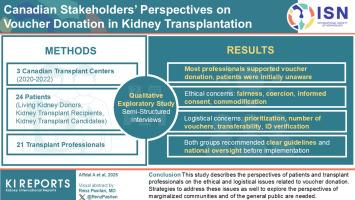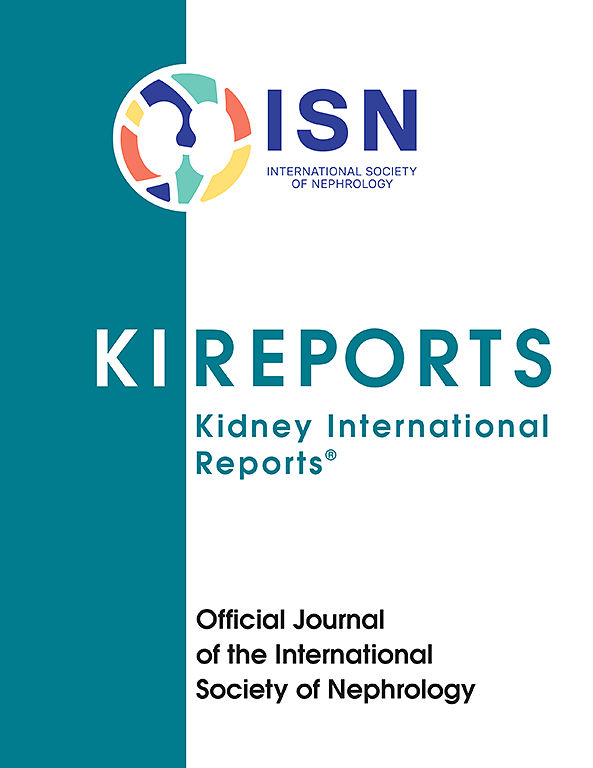Canadian Stakeholders’ Perspectives on Voucher Donation in Kidney Transplantation
IF 5.7
2区 医学
Q1 UROLOGY & NEPHROLOGY
引用次数: 0
Abstract
Introduction
Living donation remains the best therapy for people with end-stage kidney disease. Voucher donation allows donation to take place at the time that is most convenient for the donor. In this type of donation, a voucher is issued that can later be exchanged by a person in need of a kidney transplant. Voucher donation raises numerous issues. The objective of this study was to gather the perspectives of patients and transplant professionals on voucher donation.
Methods
We conducted interviews with 24 patients and 21 transplant professionals between November 2020 and December 2022. The interviews were digitally recorded, transcribed, and analyzed using the qualitative description approach.
Results
Most participants were open-minded about the possibility of implementing voucher donation because it could increase the number of available organs; however, they raised the following ethical concerns: issues of fairness, risks of undue pressure, informed consent, and risks of commodification. Prioritization among voucher holders, the number of vouchers allowed, the transferability of vouchers, and the verification of voucher holder’s identity were the logistical issues raised. Actions suggested before implementing this program included the following: a regulatory framework or guidelines, educational tools, patient engagement, and management by a national program.
Conclusion
This study describes the perspectives of patients and transplant professionals on ethical and logistical issues related to voucher donation. Strategies to address these issues as well to explore the perspectives of marginalized communities and of the general public are needed.

加拿大利益相关者对肾移植代金券捐赠的看法
活体捐献仍然是终末期肾病患者的最佳治疗方法。凭单捐赠允许捐赠在最方便的时间进行。在这种类型的捐赠中,会发放一张代金券,以后需要肾脏移植的人可以用代金券交换。代金券捐赠引发了许多问题。本研究的目的是收集患者和移植专业人员对代金券捐赠的看法。方法于2020年11月至2022年12月对24名患者和21名移植专业人员进行访谈。访谈以数字方式记录、转录,并使用定性描述方法进行分析。结果大多数参与者对实施代金券捐赠的可能性持开放态度,因为代金券可以增加可用器官的数量;然而,他们提出了以下伦理问题:公平性问题、过度压力的风险、知情同意和商品化的风险。代金券持有人的优先次序、允许的代金券数量、代金券的可转让性以及代金券持有人身份的验证是提出的后勤问题。在实施该计划之前建议采取的行动包括:监管框架或指导方针、教育工具、患者参与和国家计划的管理。结论本研究描述了患者和移植专业人员对代金券捐赠相关伦理和后勤问题的看法。需要制定战略来处理这些问题,并探讨边缘化社区和一般公众的观点。
本文章由计算机程序翻译,如有差异,请以英文原文为准。
求助全文
约1分钟内获得全文
求助全文
来源期刊

Kidney International Reports
Medicine-Nephrology
CiteScore
7.70
自引率
3.30%
发文量
1578
审稿时长
8 weeks
期刊介绍:
Kidney International Reports, an official journal of the International Society of Nephrology, is a peer-reviewed, open access journal devoted to the publication of leading research and developments related to kidney disease. With the primary aim of contributing to improved care of patients with kidney disease, the journal will publish original clinical and select translational articles and educational content related to the pathogenesis, evaluation and management of acute and chronic kidney disease, end stage renal disease (including transplantation), acid-base, fluid and electrolyte disturbances and hypertension. Of particular interest are submissions related to clinical trials, epidemiology, systematic reviews (including meta-analyses) and outcomes research. The journal will also provide a platform for wider dissemination of national and regional guidelines as well as consensus meeting reports.
 求助内容:
求助内容: 应助结果提醒方式:
应助结果提醒方式:


